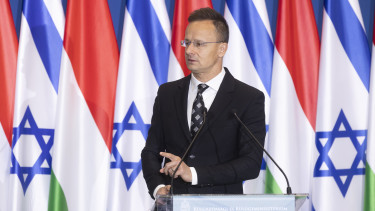Fuel price changes coming up in Hungary on Thursday
Following the changes we should find the following average fuel prices at the pumps tomorrow:
- 95-octane petrol: HUF 616 /litre
- Diesel: HUF 623 /litre
The price of petrol has breached the HUF 600 per litre psychological level on 20 June and it has been rising ever since.
Let's see how fuel prices will compare to four sort of arbitrary 'benchmarks':
- End of 2023: petrol +8.1% (HUF 46), diesel +5.1% (HUF 30);
- 10 June (day after EP and municipal elections): petrol +4.4% (HUF 26), diesel +4.5% (HUF 27);
- 2024 peak: petrol -5.2% (HUF -34), diesel -5.7% (HUF -38);
- Mid-January low: petrol +10.2% (HUF 57), diesel +6.1% (HUF 36).


In early May, a litre of diesel still cost HUF 14 less than a litre of petrol. By Thursday, it will be HUF 7 more expensive, as the gap has been narrowing since it hit HUF 21 on 22 June.

After repeated threats and weeks of hostile statements, Minister of National Economy Márton Nagy summoned the representatives of Hungarian fuel retailers to his ministry on Monday to discuss the "unacceptable" situation of fuel prices being above the average of neighbouring countries again.
Hungarian prices vs. average of the neighbouring countries
The European Commission's Weekly Oil Bulletin has been published today with the latest fuel prices for Europe as of 8 July.
The data show that Hungary's petrol and diesel prices were BELOW the average of neighbouring countries on Monday. Note that the Central Statistical Office (KSH) uses the same data and calculates the average without Hungarian prices, hence the - moderately important - differentiation shown in the graphs.
Based on EC data, the price of petrol in Hungary was lower by HUF 9 to HUF 10 than the average of the neighbouring countries, while a litre of diesel was about HUF 4 cheaper on 8 July.
Our own data series based on locally reported (holtankoljak.hu) average prices show a smaller difference, though. According to this, a litre of petrol cost HUF 618 on average on Monday, i.e. it was only HUF 4 to HUF 5 lower than the average, while diesel cost HUF 630, exceeding the average by about HUF 2.


Changes in methodology coming up
Under a proposal by the Association of Independent Petrol Stations and the Hungarian Petroleum Association, it would be more efficient to carry out statistical comparisons on a monthly rather than weekly basis, which would help to eliminate differences due to the specificities of neighbouring countries.
Economy Minister Márton Nagy told a press conference today that he agrees with and supports the above proposal. He added that they would recommend the KSH to publish on the first Friday of every month the average prices of neighbouring countries of the preceding month, along with an analysis of situation.
Accordingly, the government would take the average prices into consideration every month instead of every week, he added.
In response to a question, the minister said that the government is not considering cutting taxes on fuel, as the tax content of fuel is in line with the EU average.
Raising the excise tax on fuel (by HUF 42 per litre) was necessary due to EU rules, but its level could have been lower: the two-stage increase implemented in January was set at a level sufficient to cover the EUR 420 exchange rate, so there is ample room for manoeuvre to reduce the burden (currently 392 forints per euro).
As to what regulatory instruments the government would intervene with if fuel retailers did not reduce prices sufficiently, Márton Nagy said the government was considering several possible regulatory measures. He warned that the government would be able to take a decision very quickly if dealers did not comply with this call.
This must be respected, there is no way we will tolerate this issue,
the minister stressed, adding that dialogue is a better way than intervention by forceful means, and that to this end, efforts will be made to introduce a methodology that is fair to both sides.
Márton Nagy also said that they are already working on the KSH to try to switch to the new methodology from this Friday. The government will hold its next meeting at the end of July, where they will report on these developments.









